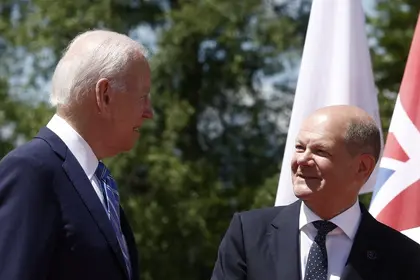German Chancellor Olaf Scholz will Friday hold talks in Washington with President Joe Biden focused on sustaining military support for war-torn Ukraine as a political impasse holds up a multi-billion-dollar US package.
High on the agenda will also be escalating tensions in the Middle East, where Israel's war against Hamas is raging on and Washington has launched strikes on Iran-linked targets following attacks on American troops.
JOIN US ON TELEGRAM
Follow our coverage of the war on the @Kyivpost_official.
The United States is Kyiv's biggest military backer, and Germany its second biggest, and the Biden-Scholz meeting comes almost two years since Russia launched its invasion of Ukraine.
Along with other countries, Washington and Berlin have sent a vast array of weapons and other support to Kyiv. But the conflict has become bogged down and doubts are growing about further aid from Kyiv's Western backers, which would be a boost for Russian President Vladimir Putin.
Ahead of his departure for Washington Thursday, Scholz urged both the EU and US to step up efforts to provide aid to Ukraine.
Ukraine's Western allies have to "send a very clear signal to the Russian president -- that he cannot count on our support diminishing but that it will last long enough, and it will be big enough", he said.
- Senate chaos -
In the United States, a White House request for some $60 billion in military aid for Kyiv has struggled to make it past the Senate.

Export Season 2024/25: How Much Grain, Oilseed Crops Ukraine Plans to Sell
The package cleared the first hurdle on Thursday when US lawmakers voted to consider the bill, but opposition from right-wing allies of Republican presidential candidate Donald Trump means final passage remains far from guaranteed.
This stands in contrast to Europe, where EU leaders last week agreed 50 billion euros ($54 billion) of aid for Ukraine, overcoming months of opposition from Hungarian leader Viktor Orban.
Scholz has voiced hope this can help Biden to push through the package in the US.
In an editorial published in the Wall Street Journal before the trip, he warned a Russian victory in Ukraine would "dramatically change the face of Europe" and "deal a severe blow to the liberal world order".
On his arrival in Washington Thursday, Scholz was set to dine with members of Congress, although a senior White House official insisted earlier this week there would be no pressure on him to "deliver any particular message".
While the picture in Europe is more encouraging for Kyiv, there are also signs of growing fatigue as the war grinds on.
The EU's foreign policy chief Josep Borrell admitted last week that the bloc would supply Ukraine with just over half of the one million artillery shells it promised to send by March.
- Mideast tensions -
Accusations have been levelled at countries such as France, Italy and Spain that they are not pulling their weight, while even Germany has come under fire for refusing to provide long-range missiles sought by Kyiv.
The Middle East will also be in focus at Friday's talks, where there is no sign of a let-up in Israel's four-month offensive in Gaza.
Regional tensions were ratcheted up by the death of the American soldiers in Jordan at the end of January, marking the first US military losses to hostile fire in the region since the Israel-Hamas war broke out on October 7.
Biden blamed Tehran-aligned groups, and Washington has launched deadly strikes on Iran-backed forces in Syria and Iraq.
US Secretary of State Antony Blinken also made his latest visit to the region this week, although he did not secure a pause in fighting.
Germany has steadfastly backed Israel and its right to self-defence but has also repeatedly warned of the dangers of a wider regional conflict, while stepping up calls for more humanitarian aid to reach the war-ravaged Gaza Strip.
You can also highlight the text and press Ctrl + Enter






